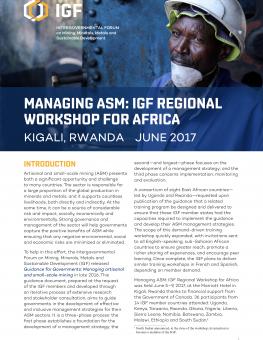
Managing ASM: IGF Regional Workshop for Africa
A consortium of East African countries requested training on how to implement the IGF Guidance for Governments: Managing Artisanal and Small-Scale Mining. The workshop sought to enhance the capacities of government representatives from 14 African countries, create opportunities for knowledge sharing and establish a community of practice.
A consortium of East African countries requested training on how to implement the IGF Guidance for Governments: Managing Artisanal and Small-Scale Mining. The workshop sought to enhance the capacities of government representatives from 14 African countries, create opportunities for knowledge sharing and establish a community of practice.
Artisanal and small-scale mining (ASM) presents both a significant opportunity and challenge to many countries. The sector is responsible for a large proportion of the global production in minerals and metals, and it supports countless livelihoods, both directly and indirectly. At the same time, it can be a source of considerable risk and impact, socially, economically and environmentally. Strong governance and management of the sector will help governments capture the positive benefits of ASM while ensuring that any negative environmental, social and economic risks are minimized or eliminated.
To help in this effort, the Intergovernmental Forum on Mining, Minerals, Metals and Sustainable Development (IGF) released the IGF Guidance for Governments: Managing Artisanal and Small-Scale Mining in late 2016. This guidance document, prepared at the request of IGF members and developed through an iterative process of extensive research and stakeholder consultation, aims to guide governments in the development of effective and inclusive management strategies for their ASM sectors.
A consortium of eight East African countries—led by Uganda and Rwanda—requested upon publication of the guidance that a related training program be designed and delivered to ensure that these IGF member states had the capacities required to implement the guidance and develop their ASM management strategies. The scope of this demand-driven training workshop quickly expanded, with invitations sent to all English-speaking sub-Saharan African countries to ensure greater reach, promote a richer sharing of experiences, and encourage peer learning. The IGF plans to deliver similar training workshops in French and Spanish.
Managing ASM: IGF Regional Workshop for Africa was held June 5–9, 2017, at the Marriott Hotel in Kigali, Rwanda thanks to financial support from the Government of Canada. 36 participants from 14 IGF member countries attended: Uganda, Kenya, Tanzania, Rwanda, Ghana, Nigeria, Liberia, Sierra Leone, Namibia, Botswana, Zambia, Malawi, Ethiopia and South Sudan.
The goal of the workshop was to enhance the capacity of participants to apply and implement the IGF Guidance for Governments on Managing Artisanal and Small-Scale Mining. The workshop objectives were to:
- Train IGF member representatives to understand the IGF Guidance.
- Create opportunities for knowledge sharing and peer learning on cross-cutting ASM issues and challenges.
- Put in place a community of practice to support the integration of the IGF Guidance in the participating countries.
Participating experts
You might also be interested in
IGF Mining Policy Framework Assessment: Rwanda
This report presents the assessment results for Rwanda, with a view to helping the government target its efforts in implementing the IGF Mining Policy Framework, while informing capacity-building efforts and allowing for monitoring of progress over time.
Artisanal and Small-Scale Mining of Critical Minerals
This report examines the potential for artisanal and small-scale mining (ASM) to take an expanded role in the global supply of critical minerals.
Navigating Global Sustainability Standards in the Mining Sector
This brief examines the latest developments and trends in responsible mining standards and voluntary sustainability initiatives.
Leveraging Digital Infrastructure for Mining Community Resilience
This report explores the socio-economic impacts and potential of new technologies in the mining sector.